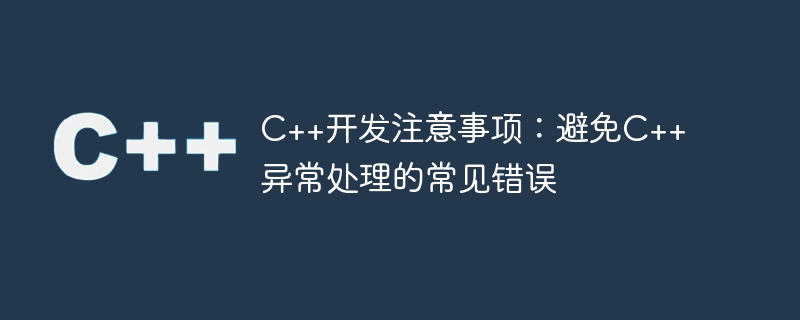Home >Backend Development >C++ >C++ Development Notes: Avoid Common Mistakes in C++ Exception Handling
C++ Development Notes: Avoid Common Mistakes in C++ Exception Handling
- WBOYWBOYWBOYWBOYWBOYWBOYWBOYWBOYWBOYWBOYWBOYWBOYWBOriginal
- 2023-11-22 10:56:37606browse

C Development Notes: Avoid Common Mistakes in C Exception Handling
In C development, exception handling is an important topic. Good exception handling can enhance the robustness and reliability of the program, but in practice, many developers often make some common mistakes. This article will introduce common mistakes in C exception handling and discuss how to avoid these mistakes.
The first common mistake is to ignore exceptions. Sometimes developers may ignore exceptions without handling them appropriately. Although exception handling in C is optional, ignoring exceptions may result in a program that fails to handle error conditions correctly, creating potential risks. To avoid ignoring exceptions, developers should use appropriate try-catch blocks to catch and handle exceptions to ensure that the program responds correctly to exception conditions.
Another common mistake is misuse of exceptions. Some developers may rely too much on exceptions for error handling, while neglecting other more appropriate methods, such as returning error codes or using assertions. Although the exception handling mechanism is very powerful, misuse of exceptions may affect the readability and performance of the code. To avoid misuse of exceptions, developers should carefully choose when to use exceptions rather than using them as the default error handling mechanism. It is best to use static assertions for errors that can be detected at compile time, and exceptions for runtime errors.
Another common mistake is resource leakage when handling exceptions. An important challenge in exception handling in C is ensuring that resources are properly released when an exception occurs. However, some developers may forget to release resources during exception handling, causing resource leaks. In order to avoid resource leaks, developers should use RAII (resource acquisition and initialization) technology to hand over resource management to the object's constructor and destructor to ensure that resources can be released correctly under any circumstances. .
The last common mistake is the misuse of exception specifications. C allows exception specifications to be specified in function declarations, but this feature is rarely used because it limits the flexibility of the function and makes it difficult in practice to correctly specify all possible exceptions. Therefore, misuse of exception specifications may lead to increased maintenance costs of the code without bringing much benefit. To avoid misuse of exception specifications, developers should use exception specifications only when they are truly needed and carefully consider the impact when specifying exception specifications.
In conclusion, C exception handling is an important topic, but in practice it is easy to make some common mistakes. To avoid these mistakes, developers should catch and handle exceptions explicitly, choose carefully when to use exceptions, ensure resources are released correctly, and use exception specifications carefully. By avoiding these common mistakes, developers will be able to write more robust and reliable C programs.
The above is the detailed content of C++ Development Notes: Avoid Common Mistakes in C++ Exception Handling. For more information, please follow other related articles on the PHP Chinese website!

